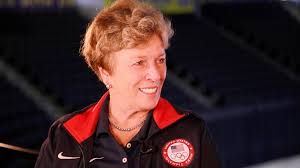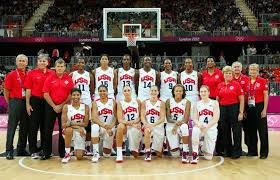The NBA Finals date back to 1947 (when they were known as the Basketball Association of America Finals) and the very 1st NCAA tourney was held in 1939. Olympic basketball competition is even older: it debuted as a demonstration event in 1904 and the men’s version became a medal sport in 1936, with the women finally getting their chance to go for the gold in 1976. The United States has dominated Olympic basketball competition from the start: the men have won 15 gold medals in the 18 tournaments they have participated in during the past 84 years, while the women have won 8 gold medals in the 10 tournaments in which they have competed during the past 44 years. Those of you who were looking forward to the 2020 Olympics opening ceremonies in Tokyo on July 24, 2020 will have to wait an extra 364 days, as the coronavirus caused a postponement until July 23, 2021. Due to the absence of college basketball since mid-March, HoopsHD’s Jon Teitel decided to fill the void by trying to interview as many prior Olympic players/coaches as possible so that you have something to read this summer while not watching the Summer Games. We continue our coverage by chatting with Marynell Meadors about winning a gold medal in 2012. Today marks the 8th anniversary of team USA beating France 86-50 in the final game to clinch a gold medal.
You were raised in Nashville: how did you make the decision in the 7th grade that you were going to become a women’s basketball coach even though there were no teams in city schools back then? I just loved the sport. The county schools had sports for girls but my PE teacher really inspired me to get into it.
You went to college at Middle Tennessee State: was it weird to begin coaching women’s basketball while still a student in 1963 even before it became a varsity sport? No question about it. I was able to play 2 years for Hall of Fame coach Sue Gunter, who later did many great things at LSU. When she left there was nobody else left to help people who were interested in playing so they all got together and decided that I should become player-coach. I just liked to compete: I grew up with 3 male cousins and 1 brother and was always competitive with them.
In 1970 you became head coach at Tennessee Tech: how did your job change after the passage of Title IX, and what did you do with your 1st annual budget of $100?! The money did not go very far! We held yard sales/bake sales/car washes: anything we could do to raise money to compete. Back then we had “play days” where we would load up, travel to another school to play, and then sleep 4 to a room in the dorms. The main thing I spent the money on was gas to get us to the other gyms. After graduating from Middle Tennessee I had a degree in kinesiology.
You won 6 consecutive Tennessee state championships with the Golden Eagles, were a 2-time OVC COY, and became the 1st major women’s college coach to win 350 games at 1 institution: how were you able to have so much success for such a long period of time? Tennessee was/is a hotbed for women’s basketball. We had a lot of great women’s coaches/athletes and I was fortunate to be in the center of the state near Nashville.
In 1997 you became 1 of the WNBA’s original 8 head coaches when you were hired by the Charlotte Sting: how big a deal was it at the time, and what has been the biggest change in the league over the past quarter-century? I attended the 1996 Olympics and in Atlanta ended up sitting right behind David Stern and his staff who were in charge of creating the WNBA. That Olympic team was the springboard for women’s basketball. Players/opportunities have both gotten better over time.
In 2008 you became GM of the Atlanta Dream: could you have ever imagined that Angel McCoughtry would become a 2-time Olympian when you drafted her 1st overall in 2009, and how were you able to convince Hall of Famer Chamique Holdsclaw to come out of retirement? I did not even have to go watch Angel play because I knew that she was a tremendous player who would help us win games. We put the ball in her hands and it changed everything for Atlanta as we improved from 4 wins to 18 wins in just 1 year. It helped that Chamique had a home in Atlanta so I talked to her team in LA for about 18 months until we agreed to a trade. She was such a good player and also a mentor to Angel on how to be a professional athlete. Chamique is right with Sue Bird/Diana Taurasi among the greatest players ever and helped put fans in the stands.
You made the WNBA Finals in 2010 and 2011 as coach of Atlanta: how close did you come to beating Seattle (all 3 games decided by 3 PTS or less)/Minnesota? All 3 games with Seattle were close so it was a very competitive series. Minnesota had all of the star power but for a franchise as young as we were to make it to the Finals in back-to-back years was incredible. We had such good chemistry between our players/coaching staff.
You were an assistant to Geno Auriemma at the 2012 Olympics: what makes Geno such a great coach, and what did it mean to you to win a gold medal? That is the peak of your coaching career: to represent USA Basketball/win a gold medal. A lot of people find fault with him but he is an excellent coach who knows what he is doing. I enjoyed every moment of it because his pregame talks were always geared toward something without calling anyone out by name. He was so inspiring to me and the players would then use it to their advantage. His work ethic is incomparable. The USA Basketball people are the best at what they do: Carol Callan has remained a close friend of mine since the Olympics and I cannot say enough good things about them. I worked with Doug Bruno, who is a super guy and a great coach.
You have been inducted into many Halls of Fame including Tennessee Tech and the OVC: where do those rank among the highlights of your career? Those are always nice to have but I do not put them right at the very top. They are great honors but it goes back to the way that I tried to help my players chase their dreams. If I had to do it over again I would do the same thing.
When people look back on your career, how do you want to be remembered the most? I was a fair/honest coach who did things the right way and tried to help my players become the best that they could be. I still miss it because I worked with so many nice people and made so many great friends. I got a letter from Tennessee Tech the other day that they will be celebrating 50 years of basketball this year at homecoming. It was very difficult for me to leave but I knew that I would have to make a move to accomplish all of the goals that I still had left. I helped Florida State get back into the NCAA tourney, which was always 1 of my goals. I have been on a tremendous journey and enjoyed every second of it.


